1第一章-(词汇学序言)
词汇学第一章

words in a language. 但词汇也可以指一种方言、一本书、
Classification of words
Full words: content/notional words They are meaningful in themselves. (nouns, verb, adj, adv, numerals) Form words: grammatical/functional words They are meaningful only when combining with other words. So they have no independent meanings proper(狭义的,严格意义上的). (articals, prep, conj, pron, pronominal adverbs) (代副词: when, where)
The Riddle Game
1. A mouse has a large pocket. What is it? 2. What room has no walls, no doors, no windows, and no floors? 3. I begin with T and end with T,and I am full of T. What am I? 4. How do we know the ocean is friendly? 5. What will you break once you say it? 6. Who is closer to you, your mom or your dad? 7. What letter is a question?
英语词汇学第一章
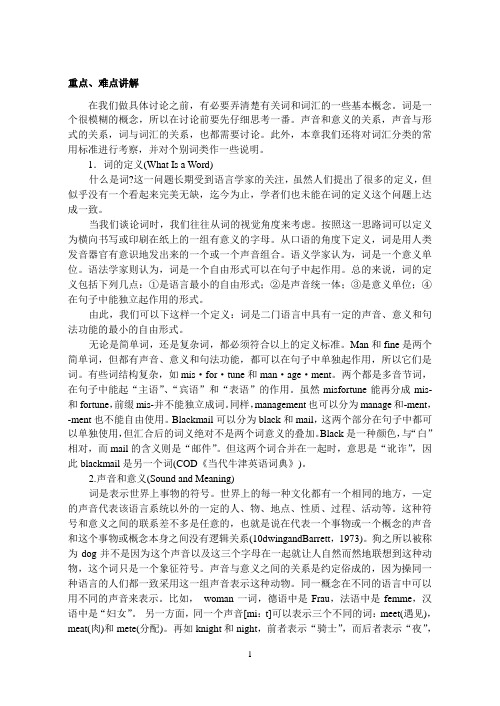
重点、难点讲解在我们做具体讨论之前,有必要弄清楚有关词和词汇的一些基本概念。
词是一个很模糊的概念,所以在讨论前要先仔细思考一番。
声音和意义的关系,声音与形式的关系,词与词汇的关系,也都需要讨论。
此外,本章我们还将对词汇分类的常用标准进行考察,并对个别词类作一些说明。
1.词的定义(What Is a Word)什么是词?这一问题长期受到语言学家的关注,虽然人们提出了很多的定义,但似乎没有一个看起来完美无缺,迄今为止,学者们也未能在词的定义这个问题上达成一致。
当我们谈论词时,我们往往从词的视觉角度来考虑。
按照这一思路词可以定义为横向书写或印刷在纸上的一组有意义的字母。
从口语的角度下定义,词是用人类发音器官有意识地发出来的一个或一个声音组合。
语义学家认为,词是一个意义单位。
语法学家则认为,词是一个自由形式可以在句子中起作用。
总的来说,词的定义包括下列几点:①是语言最小的自由形式;②是声音统一体;③是意义单位;④在句子中能独立起作用的形式。
由此,我们可以下这样一个定义:词是二门语言中具有一定的声音、意义和句法功能的最小的自由形式。
无论是简单词,还是复杂词,都必须符合以上的定义标准。
Man和fine是两个简单词,但都有声音、意义和句法功能,都可以在句子中单独起作用,所以它们是词。
有些词结构复杂,如mis·for·tune和man·age·ment。
两个都是多音节词,在句子中能起“主语”、“宾语”和“表语”的作用。
虽然misfortune能再分成mis-和fortune,前缀mis-并不能独立成词。
同样,management也可以分为manage和-ment,-ment也不能自由使用。
Blackmail可以分为black和mail,这两个部分在句子中都可以单独使用,但汇合后的词义绝对不是两个词意义的叠加。
Black是一种颜色,与“白”相对,而mail的含义则是“邮件”。
词汇学(第一章)-PPT课件
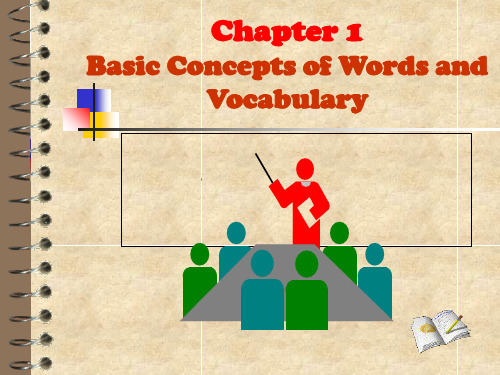
.
14
3. Native words and borrowed words 本族语词和外来语词
Native words / Angle-Saxon words
Words of Anglo-Saxon origin are native
words. They form the great majority of the
.
13
Another important characteristic is that function words belong to a relatively small and permanent set of words, in comparison to content words. The total number of functional words is about 154. They are stable; they do not come and go with changing fashions and ideas.
basic word stock of the English language.
The basic word stock is the foundation of the
vocabulary accumulated over a number of
epochs. Most native words in modern
.
6
What causes the differences between sound and form?
➢ 1) More morphemes than letters, ➢ 2) Stabilization of spelling, ➢ 3) Deliberate change of spelling by
英语词汇学-第一章

语素是音义相结合的最小的语言单位。 一般地说,一个语素就是一个音节,书面上就是一个汉字,有时侯还是一个词。但是音节是从语音学角度分析的结果,文字是书面记录的符号,语素则是语言中构词的基本成份,词是指音义相结合的能够独立运用的最小的语言单位。这四者角度不同,并不是一回事。 1、同一个汉字,可以代表不同的语素。 汉字虽然相同,但读音不同:会议/会计 汉字和读音都相同,但是词性不同:老人/老虎/老是捣乱 汉字、读音和词性都相同,但是意义不同:公家/公牛 2、汉语的语素绝大多数是单音节的,但有时侯,一个汉字并不代表一个语素,只代表一个音节,也就是说,一个语素也可以是两个以上音节。 连绵词:磅礴;口语词:尴尬;音译词:咖啡,奥林匹克 3、有时侯,一个汉字在不同场合,有的是语素,有的不是语素。 马匹(语素)/马达(非语素) (邵敬敏,现代汉通论,上海教育出版社,2001,P113-4)
2
Sound and meaning
Sound and meaning
This symbolic connection is almost always arbitrary. There is no logical relationship between the sound which stands for a thing or an idea and the actual thing and idea itself. Lodwig and Barrett, 1973
Why the written form is not always similar to the oral form?
The development of the language letters from Romans for 46 sounds in English The pronunciation has changed more rapidly than spelling over the years. Some of the differences were created by the early scribes.
英语词汇学第一章
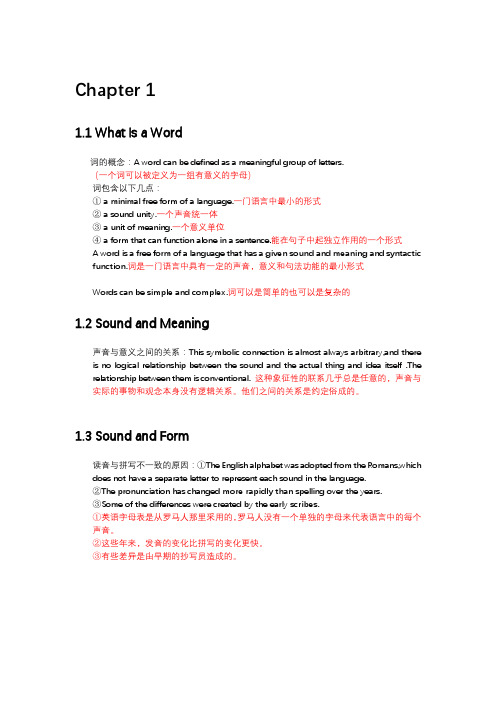
Chapter 11.1 What Is a Word词的概念:A word can be defined as a meaningful group of letters.(一个词可以被定义为一组有意义的字母)词包含以下几点:① a minimal free form of a language.一门语言中最小的形式② a sound unity.一个声音统一体③ a unit of meaning.一个意义单位④ a form that can function alone in a sentence.能在句子中起独立作用的一个形式A word is a free form of a language that has a given sound and meaning and syntacticfunction.词是一门语言中具有一定的声音,意义和句法功能的最小形式Words can be simple and complex.词可以是简单的也可以是复杂的1.2 Sound and Meaning声音与意义之间的关系:This symbolic connection is almost always arbitrary,and there is no logical relationship between the sound and the actual thing and idea itself .The relationship between them is conventional. 这种象征性的联系几乎总是任意的,声音与实际的事物和观念本身没有逻辑关系。
他们之间的关系是约定俗成的。
1.3 Sound and Form读音与拼写不一致的原因:①The English alphabet was adopted from the Romans,which does not have a separate letter to represent each sound in the language.②The pronunciation has changed more rapidly than spelling over the years.③Some of the differences were created by the early scribes.①英语字母表是从罗马人那里采用的,罗马人没有一个单独的字母来代表语言中的每个声音。
词汇学第一章 The Basic Concepts of Words and VocabularyPPT
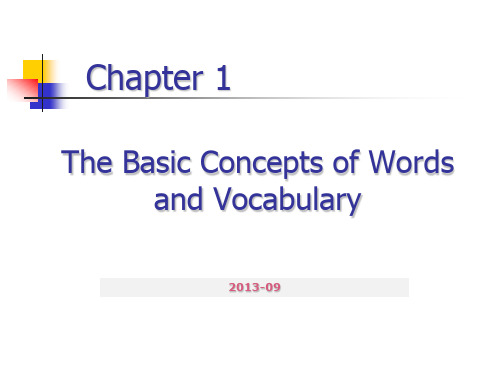
1.4 Sound and Form
Task 1 Say the following words by yourself.
cough
thought
though
thorough
tough
through
Question: why is there the disparity?
The international reason Changes Borrowings
1.3 Sound and Meaning
In how many languages do you know the name of the animal in this picture?
Task 1 Say the name of the animal in
as many languages as you can.
content words and which are functional words? denote never and run notion upon seven Christmas have would
1.5.3 Native words & borrowed words
Task
Guess whether the statements are true or false.
non-basic vocabulary
Not all the words of the basic word stock have these features.
Non-basic vocabulary include:
Terminology 专业术语 Jargon 行话 Slang 俚语 Argot 隐语 Dialectal words 方言词 Archaisms 古词语 Neologisms 新词语
现代英语词汇学概论第一章汉语版
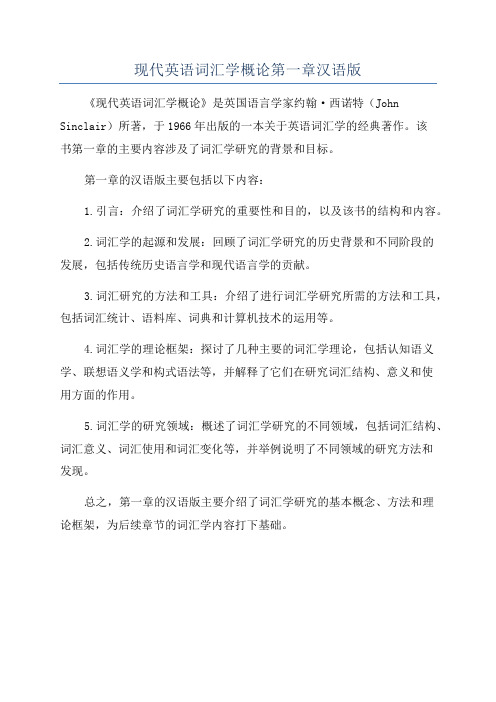
现代英语词汇学概论第一章汉语版
《现代英语词汇学概论》是英国语言学家约翰·西诺特(John Sinclair)所著,于1966年出版的一本关于英语词汇学的经典著作。
该
书第一章的主要内容涉及了词汇学研究的背景和目标。
第一章的汉语版主要包括以下内容:
1.引言:介绍了词汇学研究的重要性和目的,以及该书的结构和内容。
2.词汇学的起源和发展:回顾了词汇学研究的历史背景和不同阶段的
发展,包括传统历史语言学和现代语言学的贡献。
3.词汇研究的方法和工具:介绍了进行词汇学研究所需的方法和工具,包括词汇统计、语料库、词典和计算机技术的运用等。
4.词汇学的理论框架:探讨了几种主要的词汇学理论,包括认知语义学、联想语义学和构式语法等,并解释了它们在研究词汇结构、意义和使
用方面的作用。
5.词汇学的研究领域:概述了词汇学研究的不同领域,包括词汇结构、词汇意义、词汇使用和词汇变化等,并举例说明了不同领域的研究方法和
发现。
总之,第一章的汉语版主要介绍了词汇学研究的基本概念、方法和理
论框架,为后续章节的词汇学内容打下基础。
词汇学.chapter 1

e.g. sum some;
cum wuman wunder come; woman; wonder;
ghoti
fish
Shaw
munk
monk
“The written form of English is, therefore,an imperfect representation of the phonetic elements of the spoken language.” ——Quirk, (1978)
e.g. man / fine; misfortune
management; blackmail
Word: a word is a minimal free form of a
language that has a given sound, meaning and syntactic function.
Word——Vocabulary 1.2 Vocabulary: All the words in a
language make up what is generally known as its vocabulary.
1. the total number of the words in a language; 2. all the words used in a particular historical period:Old;Middle;Modern 3. all the words of a dialect, a given book, a given discipline
What’s a name? That which we call a rose
By any other name would smell as sweet ——Shakespeare: Romeo and Juliet
- 1、下载文档前请自行甄别文档内容的完整性,平台不提供额外的编辑、内容补充、找答案等附加服务。
- 2、"仅部分预览"的文档,不可在线预览部分如存在完整性等问题,可反馈申请退款(可完整预览的文档不适用该条件!)。
- 3、如文档侵犯您的权益,请联系客服反馈,我们会尽快为您处理(人工客服工作时间:9:00-18:30)。
•
When we talk about a word, we tend to think in visual terms. In this line a word can be defined as a meaningful group of letters, printed or written horizontally across a piece of paper. As defined in terms of spoken language, a word is viewed as a sound or combination of sounds which are made voluntarily with human vocal equipment. According to semanticists, a word is a unit of meaning. Grammarians, however, insist that a word be a free form that can function in a sentence, etc.
automatically suggest the animal in question. The relationship between them is conventional because people of the same speech community have agreed to refer to the animal with this cluster of sounds. Just as Shakespeare says “What’s in the name? That which we call a rose. By any other name would smell as sweet.” ( 'Romeo and Juliet, ActⅡ, Scene 2) In different languages the same concept can be represented by different sounds. For example, the English word house refers to a building for people to live in. In Chinese it is called fangzi in French maison, in Russian dom, in Spanish casa.
• • • •
To sum up, the definition of a word comprises the following points: a minimal free form of a language; a sound unit; a unit of meaning; a form that can function alone in a sentence Therefore, we can say that a word is a minimal free form of a language that has a given sound and meaning and syntactic function.
All these symbols ( either spoken or written ) are totally different from one another, yet they all signify “house” in their respective languages, because people have accustomed from early childhood to use them as a conventional and generally accepted symbol for “house”. (中国古代哲学家荀卿在其《正名篇》中说:
“ ´Careful with fire,´ is good advice, we know; ´Careful with words,´ is ten times doubly so.”
— Will Carleton, The First Settler´s Story
“´ When I use a word,´ Humpty-Dumpty said,´ it means just what I choose it to mean---neither more nor less.´”
else in the world. Each of the world’s cultures has come to agree that certain sounds will represent certain persons, things, places, properties, processes and activities outside the language system. This symbolic connection is almost always arbitrary, and there is “no logical relationship between the sound which stands for a thing or an idea and the actual thing and the idea itself” (Lodwig and Barrett 1973). A dog is called a dog not because the sound and the three letters that make up the word just
The wonder of language is beyond description! “But words are things, and a small drop of ink. Falling like dew upon a thought, produces that which makes thousands, perhaps millions, think.” ____ George Gordon Byron, Don Juan “Words are what hold society together.” ____ Stuart Chase, Power of Words
Words can be simple and complex, yet all must comply with these criteria. Man and fine are simple, but they each have sound, meaning and syntactic function, and each can be used alone in a sentence. Naturally they are words. There are words which are complex such as mis·forּtune. It is a polysyllabic word and can function as “subject”, “object” and “predictive” in a sentence. Though misfortune can be further divided as mis- and fortune, the former cannot stand alone as a word. Blackmail can be separated into black and mail, and both can work as
Here is an example for illustration. The word-forms “go, goes, went, gone, going” possess different grammatical meanings of tenses, persons and so on.. In each of these forms we find the same lexical meaning expressing the process of movement. • 3) Contextual meaning: • The context generally shows in what sense the word is used, in its primary sense or its figurative sense. When used literally, words have their original meaning; when used figuratively, words have symbolic meaning. The meaning of the word is defined by the context.
现代英语词汇学
Modern English Lexicology
Compiled by Tan Jianchu
Chapter 1 A General Survey of a Word
• 1.1 Definition of a word • What is a word ? • This question has occupied the attention s definitions have been suggested, none of them seem to be perfect. Scholars still do not agree on the definition of the word.
independent units in a sentence, the meaning of each, however, is by no means the combination of the two. Black is a colour, opposite to “white”, and mail denotes “something sent by post”, yet when they are put together, the combined form means “compel, compulsion, to make payment or action in return for concealment of discreditable secrets etc.” Hence blackmail is a different word. 1.2 Sound and Meaning A word is a symbol that stands for something
